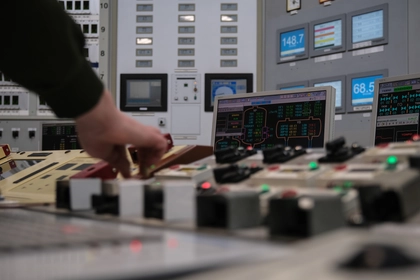Ukraine warned on Thursday it faced a "very difficult" military situation in its northeast Kharkiv region, where Moscow has made its largest territorial gains in 18 months since launching a surprise offensive last week.
As Ukrainian President Volodymyr Zelensky said Kyiv was sending yet more reinforcements to the area, the Ukrainian army said it had managed to partially halt Russia's advance.
JOIN US ON TELEGRAM
Follow our coverage of the war on the @Kyivpost_official.
Kyiv also accused Russian troops of executing civilians in territory it had captured over the last week.
The fresh Russian offensive has further stretched Ukraine's outgunned and outmanned forces.
Moscow has seized 278 square kilometres (107 square miles) of Ukrainian territory between May 9 and 15, according to AFP calculations based on data from the Institute for the Study of War (ISW) -- the largest territorial gain in a single operation since mid-December 2022.
Ukraine President Volodymyr Zelensky on Thursday met military leaders in Kharkiv city, some 30 kilometres (18 miles) from the Russian border to assess Ukraine's defensive efforts.
"The situation in the Kharkiv region is generally under control, and our soldiers are inflicting significant losses on the occupier," he said in a post on Telegram.
"However, the area remains extremely difficult. We are reinforcing our units.
Ukraine's army said earlier it had managed to halt the advancing Russian forces in some places.
"Our defence forces have partially stabilised the situation. The advance of the enemy in certain zones and localities has been halted," army spokesman Nazar Voloshin said on state TV on Thursday.

Ukraine Conducts Attack with Solely UGVs and FPV Drones, Destroying Russian Positions
In a daily briefing, Ukraine's General Staff said its forces had "significantly reduced the activity of the Russian occupiers."
"But the enemy is still trying to create the conditions for further advances," Voloshin warned.
Ukraine has been forced to evacuate around 8,800 people since Russia launched the new assault, Kharkiv Governor Oleg Synegubov said.
Some were still arriving at a humanitarian centre in Kharkiv on Thursday.
Among them was 85-year-old Nadezhda Borodina, who had her dog Vasik on a leash and her frightened cat Lucas packed in a plastic bag.
Ukrainian "soldiers arrived and shouted 'Let's go, let's go!' and we were gone in five minutes," she said.
- 'All fronts' -
Most of Russia's recent gains are in the Kharkiv area, though they have also claimed fresh territory in the eastern Donetsk and southern Zaporizhzhia regions.
Following months of stalemate on the sprawling front lines, Russia has seized the initiative on the battlefield, pushing on from the capture of industrial hub Avdiivka in February.
Russia's defence ministry said Thursday the army had "advanced deep into the enemy's defences" in the Kharkiv region.
A day earlier, Russian President Vladimir Putin had said his troops were advancing on "all fronts".
Some military analysts say Moscow may be trying to force Ukraine to divert troops from other hot spots, such as around the strategic hilltop town of Chasiv Yar in the Donetsk region.
Russia's defence ministry said Wednesday its forces had captured the symbolic village of Robotyne in the Zaporizhzhia region, some 300 kilometres (185 miles) south of Moscow's new offensive.
The settlement was one of the few successes for Kyiv of an underwhelming Ukrainian counter-offensive last summer.
The intensification of Russian attacks on multiple fronts has underscored the acute ammunition and manpower shortages crippling the Ukrainian military.
In China for a two-day state visit on Thursday, Putin said he was "grateful" to Beijing for "the initiatives they are putting forward to resolve" the war.
There are no indications Moscow and Kyiv are prepared to engage in direct talks, which Ukraine says would only be used by Russia to buy time to prepare for a new assault.
You can also highlight the text and press Ctrl + Enter






